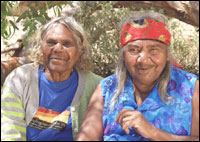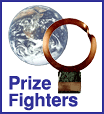In the 1950s and ’60s, the British military conducted a dozen full-scale nuclear tests in the desert of southern Australia. To the military, the region was a wasteland, the best possible place for such a project; to the Aboriginal people who had lived in the desert for millennia, the land was their home.

Eileen Kampakuta Brown and Eileen Wani Wingfield.
Photo: Robert Roll.
The military told the Aboriginals that the testing was safe, but in its wake many went blind, suffered radiation sickness, or developed cancer. Now, half a century later, the Australian government has proposed building a new radioactive-waste dump near Woomera, in the state of South Australia. The dump would store waste from a nuclear reactor in Sydney and, possibly, waste from power plants and nuclear facilities around the world. Many Aboriginals fear that their land, water, and health will be poisoned once again.
To fight the proposed dump, Eileen Wani Wingfield and Eileen Kampakuta Brown, both in their 70s, joined with five other older women to create the Coober Pedy Women’s Council, or Kungka Tjuta. Their group has written to the federal government and traveled thousands of miles to speak against the project. “It’s from our grandmothers and our grandfathers that we’ve learned about the land,” reads their Declaration of Opposition. “This learning isn’t written on paper as whitefellas knowledge is. We carry it instead in our heads and we’re talking from our hearts, for the land.” The Australian government says it plans to move ahead with the project.
Wingfield and Brown shared one of this year’s six Goldman Environmental Prizes for their efforts to stop the construction of the radioactive-waste dump. Wingfield spoke to Grist from San Francisco, where the prizes were awarded on April 14.
What do you remember about the nuclear testing in the desert in the 1950s and ’60s?
We didn’t know anything about it until a long time after. We saw them [the military] going through here, but they didn’t let no one know. None of the white people said, “The people will be getting sick; you’ve got to be careful.” Everyone was getting sick, and we didn’t have any idea at all why. My family got sick, you know, some of my children, [my grandchild] was born premature. The mother must have been sick. It’s only lately we woke up as to what the white people was doing to us.
They treated us like we wasn’t human, like we were just animals, like dogs or crows. Like we didn’t have feeling or anything. They killed us on our own land. We still are suffering. They just helped themselves to anything, they took whatever they wanted back there.
Before they let all [the bombs] off, I did my fair share. I worked like a man, mustering cattle and sheep, whatever I could. When we found out [about the testing], I realized we had nothing, didn’t even get any money [in compensation]. We were just working for tea and sugar.
Why did you and the other elders decide to fight the proposed waste dump?
We don’t want no waste dump back there, no mines back there. Those things already killed all the old people, and [the test site] is still dangerous. That dump would poison the water and poison everything else, the food, the cattle, and everything else that’s gonna live off of the water.
When the white people have a dump or a mine, when they have a meeting, they don’t put it down to Aboriginals. Why don’t they weigh the humans? The other womens [elders of the past generation] weren’t talking about it. If we don’t say anything, everybody’s going to be dead and gone.

What does this award mean for you and your group?
I didn’t expect it at all. All I was thinking about was our life, our lovely clean country, what they’ve done to our children, how they took them away. That’s a stolen generation. [Editor’s note: Between 1900 and the 1970s, the Australian government kidnapped biracial children from their Aboriginal mothers and placed them in camps and in white homes, where they were trained to be servants.]
[The prize] was a shock for me, I hardly believed it. We didn’t know anything about the money, we were just wanting to be heard for the old people, heard through the sickness. We’re trying to talk about it for our health here.
How will you spend the money?
I’m planning to buy a vehicle, maybe buy a little block [of land] where we can settle down. But if you’re going to have them coming in with the mining, the dump, why buy the land? It’s wrong for us to think about buying it anyway, the land was ours. Now we have no rights to it, no rights to go and camp on it, no rights for anything.


